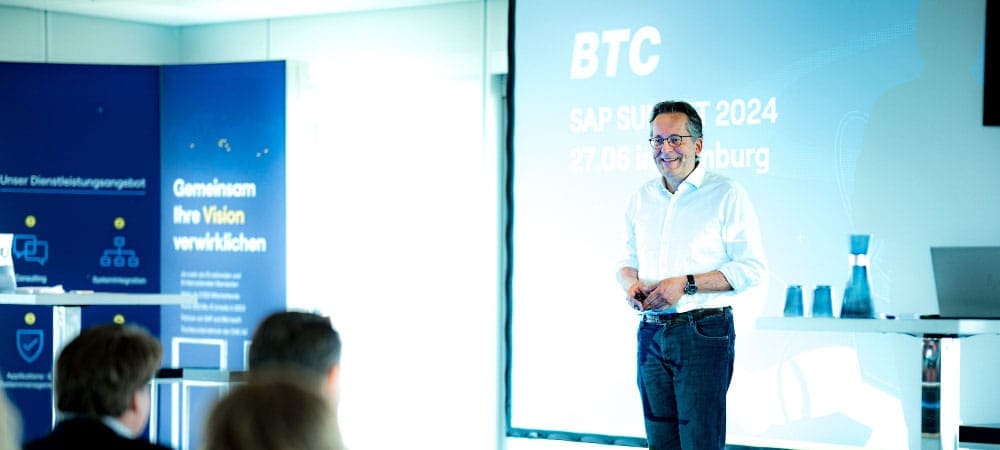Breaking down silos: Simply collaborate more efficiently with DevOps


DevOps gets companies to their goals faster with agile methods and automated workflows. Methods that break down silos and bring teams together. Tools that help increase the quality of products and services, shorten development times and accelerate the time to market of a product.
Why is this important? Because customers' demands for speed have increased, markets are becoming more dynamic, and global competition is tougher.
I am convinced that those who rely on DevOps will gain speed and increase their competitiveness. After all, this will make companies more agile in almost all areas of digitization. The prerequisite is that they have to rethink, learn - and be prepared to make compromises.
Short:
The use of DevOps requires nothing less than a change in culture. It is essential to form compact DevOps teams and not to divide them up according to specialist departments, but to set them up along the lines of corporate processes. These competence teams also need the freedom to make their own decisions.
Developers, UX consultants and product managers are the best experts for all technical and operational questions. Even when it comes to budget and resources: If the competence team has freedom here, this also makes the work more agile.
For this to succeed in a company, courage and vision are needed. Courage to break new ground. And vision to recognize how to capitalize on them.
Example:
I support retail companies and experience an open-minded climate for DevOps here. Why? The companies work with xs. Anyone who sells their goods on a large scale via an online store knows what a big impact small changes can have:
For example, providers rely on A/B tests to find out which variant of a home page layout sells more during ongoing business operations. A mentality that helps them with DevOps: "Always Beta" does not mean a life on the software construction site. It means seeing development work itself as a process that offers room for improvement during ongoing operations.
When it comes to real-time business processes, SAP comes into play. S/4 Hana makes the time factor a new currency once and for all. How DevOps can pick up speed here: for example, with SAP microservices, UI5 applications and Cloud Foundry deployments.
Instead of giving birth to an app using the tried-and-true waterfall method, small DevOps teams with short development cycles and automated testing procedures bring needed apps into the world much more quickly. Tools allow apps to be assembled at the click of a mouse. User interactions are also quickly simulated and problems identified.
When it comes to core processes, DevOps reaches its limits: Stability is required at the center of every ERP system. Manifested in the monolithic core that has been individualized for years. If you change documents and transactions carelessly because they benefit one department, you can trigger side effects that are a hindrance to others.
The problem: The SAP systems are too large, the upfront effort uneconomical. Those who rely on DevOps must trust systems and test scenarios and define target results. This is easier to do with front-end applications - but not with an evolved SAP landscape.
But:
SAP is swearing entrepreneurs in to the greenfield approach with S/4 Hana. Those who clean up the mess here, orient themselves to the standard, also create new opportunities: to make decisions in real time. And the new SAP system focuses on business processes, not departments, to develop agile with DevOps so. Then SAP and DevOps - even at their core - are not mutually exclusive.





2 comments
Norman Merten
Sehr geehrter Herr Di Croce,
vielen Dank für Ihren Kommentar und die Verlinkung zu dem Angebot der Realtech AG. Aus meiner Sicht ist der Einsatz von Tools und Erweiterungen / Entwicklungen sehr wichtig, jedoch fehlt oftmals das Mindset DevOps einsetzen zu wollen. Ihr Einsatz in dem Bereich hilft hoffentlich Kunden und Organisationen von diesem Ansatz zu überzeugen.
Viele Grüße
Norman Merten
Daniele Di Croce
Sehr geehrter Herr Norman Merten,
auch das traditionelle SAP Umfeld kann sich agilen Methoden und dem steigenden Druck auf schnellere Veränderung nicht dauerhaft entziehen. Der erste Schritt auf der DevOps Reise kann mit mehr Automatisierung schnell erfolgen, aber letzendlich muss ein Kulturwandel eintreten.
Schauen Sie mal hier: https://www.realtech.com/de/devops-fuer-sap.cfm?redir=1
Viele Grüße
Daniele Di Croce